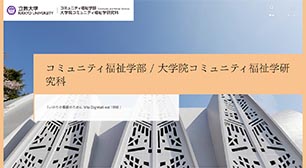Graduate School of Community and Human Services
Niiza Campus
OBJECTIVE.
An evolving graduate school
Features
Graduate School of Community and Human Services
Aiming to conduct research that contributes to solving social issues
The mission of the graduate school is to cultivate individuals who go beyond the traditional, narrow concept of social welfare by improving their ability to think about a broad range of social issues and help solve problems. The curriculum consists of two domains: Social Work Research and Community Policy Research. In Social Work Research, students conduct research into welfare issues involving individuals, families and local communities. They use social work skills to identify and propose solutions for these social issues. They also develop research abilities to contribute to the development of social welfare studies, and learn methods to practice sophisticated skills as professionals. In Community Policy Research, students conduct research into the welfare and community policies of national and local governments, community development by non-profit organizations (NPOs) and cooperatives; and the formation of informal communities and public spaces with the collaboration of local residents. They also conduct research into theories and practical approaches that can be used to support those working in the field.
In the master’s program, the Basics of Research is a mandatory subject that enables students to acquire basic investigative methods, including writing papers and research techniques. The program also provides students with opportunities to learn about the expertise of each faculty member. The program makes it easier for students to select a supervisor by allowing them to take a supervisor’s seminar from the fall semester of the first year or thereafter.
The mission of the graduate school is to cultivate individuals who go beyond the traditional, narrow concept of social welfare by improving their ability to think about a broad range of social issues and help solve problems. The curriculum consists of two domains: Social Work Research and Community Policy Research. In Social Work Research, students conduct research into welfare issues involving individuals, families and local communities. They use social work skills to identify and propose solutions for these social issues. They also develop research abilities to contribute to the development of social welfare studies, and learn methods to practice sophisticated skills as professionals. In Community Policy Research, students conduct research into the welfare and community policies of national and local governments, community development by non-profit organizations (NPOs) and cooperatives; and the formation of informal communities and public spaces with the collaboration of local residents. They also conduct research into theories and practical approaches that can be used to support those working in the field.
In the master’s program, the Basics of Research is a mandatory subject that enables students to acquire basic investigative methods, including writing papers and research techniques. The program also provides students with opportunities to learn about the expertise of each faculty member. The program makes it easier for students to select a supervisor by allowing them to take a supervisor’s seminar from the fall semester of the first year or thereafter.
Program
-
Graduate Program in Community and Human Services
Flexible Study
From the 2023 academic year, the curriculum has been revamped to allow individuals from various backgrounds to study community welfare based on their specific interests. The master’s program provides a good research environment not only for students who have majored in social welfare and other social science fields at the undergraduate level, but also for working professionals in a wide range of fields. It allows students to conduct research into various academic disciplines, offers both day and night classes, and provides flexible research instructions.Overview
Pursuing community welfare from multiple perspectives
Based on the fundamental principle of respecting the dignity of life, students conduct research into welfare, communities, humanity and lifestyles. The program offers an innovative curriculum that comprises research into social work and community policy, and which covers a wide range of areas in terms of both theory and practice.
Research from a comprehensive and interdisciplinary approach
Students learn various research approaches and develop interdisciplinary viewpoints under the guidance of experienced faculty members who are specialized in social welfare, sociology, political science, economics, local government, NPOs/NGOs, social development, public and social philosophy, bioethics and geography, among others.Feature
The ability to exchange credit from other graduate schools
Students can take classes from 12 graduate schools that belong to the Federation of Graduate Schools of Social Welfare. They can earn up to 10 credits from partner schools to put towards their own program. Federation schools include Hosei University, Sophia University, Kanto Gakuin University, Meiji Gakuin University, Japan Women’s University, Japan College of Social Work, Rissho University, Japan Lutheran College, Shukutoku University, Taisho University, Toyo University and Nihon University. This framework allows not only credit transfers, but also provides a place that transcends the boundary of each graduate school to facilitate mingling and the exchange of information among graduate schools and faculty members. It thus provides opportunities to widen the interpersonal and information networks necessary for conducting research and putting student research into practical use. There is also a mutual auditing system with St. Luke’s International University’s graduate school. There are various ways to make use of these connections, such as conducting dialogue with graduate students from different universities and being exposed to different perspectives.
A wide range of research support provided to graduate students
The Graduate School of Community and Human Services has its own systems to provide research grants from the Institute of Community and Human Services to support graduate students’ and joint research projects. About five research projects are selected for the subsidy program each year. This results in many research achievements. Furthermore, Rikkyo University provides support for graduate student research through its Special Fund for Research, and has a system to encourage participation in academic conferences.
Learn more
For more information, please visit the links below.

